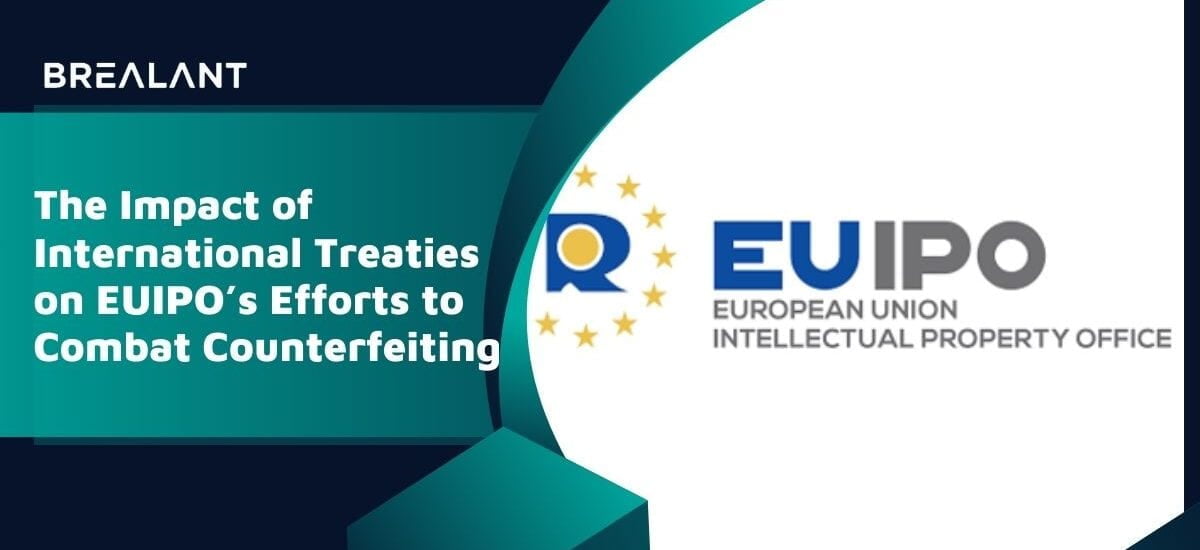
Counterfeiting has become a pervasive challenge in the globalized marketplace, posing threats to industries, economies, and consumer safety. The European Union Intellectual Property Office (EUIPO) is crucial in addressing this issue within the European Union (EU). The impact of international treaties on EUIPO’s efforts to combat counterfeiting is profound, as collaborative efforts become essential to tackle this transnational menace effectively.
Counterfeiting, a global menace that undermines economies and threatens consumer safety, has become a pervasive challenge in the modern world. The European Union Intellectual Property Office (EUIPO) plays a vital role in combating counterfeiting within the European Union (EU), and international treaties significantly influence its efforts. This article delves into the impact of these treaties on EUIPO’s strategies and initiatives aimed at curbing counterfeiting and protecting consumers and businesses.
The Global Landscape of Counterfeiting:
Counterfeiting extends across various industries, from luxury goods to pharmaceuticals, electronics, and apparel. The rise of e-commerce and the interconnectedness of international supply chains have provided counterfeiters with new avenues to produce and distribute fake products, making it a complex and evolving problem.
International Treaties as Catalysts for Collaboration:
Recognizing the cross-border nature of counterfeiting, international treaties have emerged as essential tools for fostering collaboration among nations. The Agreement on Trade-Related Aspects of Intellectual Property Rights (TRIPS) and the Anti-Counterfeiting Trade Agreement (ACTA) are prominent examples of treaties that set the framework for combating counterfeiting globally.
Under the World Trade Organization (WTO), the TRIPS Agreement establishes minimum standards for intellectual property protection, encouraging member countries, including those in the EU, to implement effective measures against counterfeiting. ACTA, a plurilateral agreement, focuses on enhancing the enforcement of intellectual property rights, including those related to counterfeiting.
Integration of International Treaties into EU Legislation:
The EU, recognizing the importance of international collaboration, has incorporated the principles of these treaties into its legal framework. Directives and regulations aimed at strengthening intellectual property rights within the EU align with the standards set by TRIPS and ACTA. The influence of international treaties on EUIPO’s strategies against counterfeiting is evident in the harmonization of legal measures across member states.
EUIPO’s Role in Counterfeit Prevention and Enforcement:
EUIPO serves as the EU’s central authority for managing trademarks and designs. Its Anti-Counterfeiting and Enforcement Team (ACET) works diligently to protect consumers and businesses from the detrimental effects of counterfeit goods. The influence of international treaties on EUIPO’s initiatives is multifaceted, encompassing legal frameworks, information sharing, and collaborative enforcement efforts.
Harmonization of Legal Standards:
International treaties set a common baseline for intellectual property protection, encouraging harmonization of legal standards across jurisdictions. EUIPO leverages this harmonization to streamline its procedures for trademark registration and enforcement. Standardized legal frameworks facilitate a more efficient response to counterfeiting, enabling consistent application of measures across EU member states.
Information Sharing and Collaboration:
Counterfeiters often exploit gaps in information to operate across borders discreetly. International treaties encourage information sharing and collaboration among countries, strengthening the collective response against counterfeiting. EUIPO, in partnership with national intellectual property offices and law enforcement agencies, actively participates in initiatives that promote the exchange of information related to counterfeit goods.
Cross-Border Enforcement Efforts:
EUIPO’s engagement with international treaties extends to cross-border enforcement activities. The agency collaborates with customs authorities, police agencies, and other stakeholders to prevent the entry and circulation of counterfeit goods within the EU. The principles of international treaties guide these collaborative efforts, emphasizing the need for coordinated action to combat counterfeiting effectively.
Technological Advancements and the Role of EUIPO:
The digital age has brought challenges and opportunities in the fight against counterfeiting. EUIPO embraces technological advancements to enhance its capabilities in detecting and preventing counterfeit activities. The agency’s engagement with international treaties aligns with the evolving nature of counterfeiting, incorporating digital tools and strategies to address online infringement and e-commerce-related challenges.
Conclusion
The impact of international treaties on EUIPO’s efforts to combat counterfeiting is profound, shaping the legal landscape, fostering collaboration, and guiding cross-border enforcement initiatives. As counterfeiting continues to evolve in the digital era, the collaborative approach facilitated by international treaties becomes increasingly critical. EUIPO’s role as a central authority within the EU is integral to translating the principles outlined in these treaties into effective strategies, ultimately safeguarding the integrity of trademarks, consumer trust, and the innovation-driven economies of the European Union. The ongoing commitment to international collaboration reflects a shared dedication to curbing counterfeiting and ensuring a fair and secure global marketplace.
By aligning its efforts with these treaties and engaging in partnerships with other intellectual property offices and customs authorities, EUIPO strengthens its position as a formidable force against counterfeit goods. The impact of international treaties on EUIPO’s anti-counterfeiting initiatives underscores the interconnectedness of global efforts to safeguard intellectual property rights, foster innovation, and protect consumers and businesses alike. Global treaties can be very sophisticated to understand but Brealant’s team of experts is here to sort all the complexities for you and guide you toward safeguarding your intellectual property.

